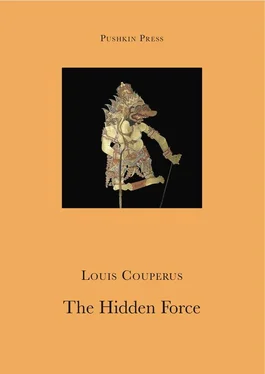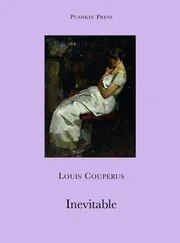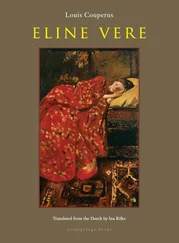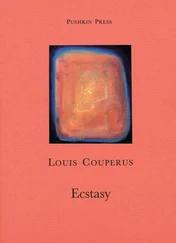Louis Couperus - The Hidden Force
Здесь есть возможность читать онлайн «Louis Couperus - The Hidden Force» весь текст электронной книги совершенно бесплатно (целиком полную версию без сокращений). В некоторых случаях можно слушать аудио, скачать через торрент в формате fb2 и присутствует краткое содержание. Год выпуска: 2012, ISBN: 2012, Издательство: Pushkin Press, Жанр: Классическая проза, на английском языке. Описание произведения, (предисловие) а так же отзывы посетителей доступны на портале библиотеки ЛибКат.
- Название:The Hidden Force
- Автор:
- Издательство:Pushkin Press
- Жанр:
- Год:2012
- ISBN:9781908968227
- Рейтинг книги:4 / 5. Голосов: 1
-
Избранное:Добавить в избранное
- Отзывы:
-
Ваша оценка:
- 80
- 1
- 2
- 3
- 4
- 5
The Hidden Force: краткое содержание, описание и аннотация
Предлагаем к чтению аннотацию, описание, краткое содержание или предисловие (зависит от того, что написал сам автор книги «The Hidden Force»). Если вы не нашли необходимую информацию о книге — напишите в комментариях, мы постараемся отыскать её.
The Hidden Force — читать онлайн бесплатно полную книгу (весь текст) целиком
Ниже представлен текст книги, разбитый по страницам. Система сохранения места последней прочитанной страницы, позволяет с удобством читать онлайн бесплатно книгу «The Hidden Force», без необходимости каждый раз заново искать на чём Вы остановились. Поставьте закладку, и сможете в любой момент перейти на страницу, на которой закончили чтение.
Интервал:
Закладка:
At Eva’s, people walked and strolled through the galleries, sat down here and there; everyone talked to everyone. It did not have the stateliness of the commissioner’s mansion, but had the chic of a French salon, with an artistic touch. It had become the custom for the ladies to dress up more for Eva’s days than for receptions at the commissioner’s house; at Eva’s they wore hats, a sign of the greatest elegance in the Indies. Fortunately, it did not matter at all to Léonie, but left her completely indifferent.
In the middle gallery Léonie was now sitting on a divan and stayed sitting there with the radèn-ayu , the prince’s wife. She found the old custom convenient; everyone came to her. At her own receptions she had to walk so much, working her way along the rows of women by the wall… Now she was taking it easy, sitting down, smiling at anyone who came to pay her a compliment. But apart from that it was a bustling throng of guests. Eva was everywhere.
“Do you like it here?” Mrs Van Does asked Léonie, casting a glance over the middle gallery, and surveying in bewilderment the line of matt arabesques painted with lime as frescos on the soft grey wall, the jati -wood panelling, carved by skilful Chinese cabinet-makers from a drawing in The Studio magazine, the bronze Japanese vases on jati-wood pedestals, in which bamboo branches and bunches of gigantic flowers cast a soft shadow up to the ceiling.
“Strange… but very nice! Unusual…” murmured Léonie, to whom Eva’s taste was still a mystery. Withdrawn as she was into her temple of egoism, what others did and felt didn’t matter to her, not even how someone else arranged their house. But she could never have lived here. She preferred her engravings — Veronese, Shakespeare and Tasso — which she thought distinguished, rather than the splendid sepia photographs of Italian masters that Eva had displayed on easels here and there. Most of all she liked her chocolate box, and the perfume advert with the cherubs.
“Do you like that dress?” Mrs Van Does then asked.
“Oh yes,” said Léonie smiling sweetly. “Eva is very clever; she painted blue irises on Chinese silk herself…”
She never said anything but sweet smiling things. She never spoke ill of people; it was all indifferent to her. And she now turned back to the radèn-ayu and thanked her in sweet, drawling sentences for some fruit she had sent. The Prince came along to talk to her and she inquired about his two young sons. She spoke in Dutch and the Prince and the radèn-ayu replied in Malay. The Prince of Labuwangi, Radèn Adipati Surio Sunario, was still young, just thirty, with a fine Javanese face like that of a supercilious wayang shadow puppet, and a little moustache with the tips carefully twisted, and above all a striking stare, a stare as if he were in a perpetual trance, a stare that seemed to plumb visible reality and see through it, a stare from eyes like glowing coals, sometimes dull and tired, sometimes glowing like sparks of ecstasy and fanaticism. Among the native population — almost slavishly attached to their royal family — he had the reputation of holiness and mystery, though no one ever got to the bottom of the matter. Here, on Eva’s veranda, he simply made the puppet-like impression of a distinguished native prince: the only surprise was his trancelike expression. The sarong that fitted smoothly around his hips hung in front in a bunch of flat, regular pleats that fluttered open; he wore a white starched shirt with diamond studs and a thin blue tie, over it a blue linen uniform jacket with gold buttons bearing the letter W for Wilhelmina and the crown; on his bare feet he wore black patent leather pumps turned up at the front; the kerchief wound carefully round his head in narrow folds gave his delicate face a feminine look, but his black eyes, occasionally tired, kept flashing in an ecstatic trance. His blue and gold belt held the golden kris dagger, fixed at the small of his back; on his small, slim hand shone a gemstone, and a cigarette case of braided gold wire peeped out of his jacket pocket. He said little — sometimes he looked drowsy, then suddenly his strange eyes would flash into life — and he replied to what Léonie said almost exclusively with a curt, abrupt:
“ Saya … Your humble servant.”
He pronounced the two syllables in a harsh, sibilant tone of politeness, giving each syllable equal emphasis, and accompanied the formula with a brief, automatic nod of the head. The radèn-ayu , seated beside Léonie, answered in the same way:
“Saya…”
Though she invariably followed it with a slightly embarrassed laugh. She was still very young, perhaps just turned eighteen. She was a princess from Solo, and Van Oudijck could not stand her, because she introduced Solo manners and Solo expressions into Labuwangi, in her arrogant assumption that nothing was as distinguished and purely aristocratic as the customs and expressions of the court of Solo. She used courtly words, which the population of Labuwangi did not understand, and she had forced on the Prince a coachman from Solo, complete with the royal livery, which included a wig and a false moustache, at which the population stared goggle-eyed. Her yellow complexion was made even paler by a light layer of rice powder, applied moist, the eyebrows slightly arched by a line of black; jewels were pinned in her hair, which she wore in a traditional glossy bun, and in the centre was a kenanga flower. Over a full-length batik robe, which according to the custom of the Solo court trailed in front of her, she wore a red brocade jacket trimmed with gold braid and fastened with three large jewels. Two fabulous gems, in heavy silver settings, weighed down her ear lobes. She wore light mesh stockings and gold-embroidered Chinese slippers. Her small, slender fingers were covered in rings, as if set with diamonds, and she carried a white feather fan.
“ Saya … saya …” she answered politely, with her shy laugh.
Léonie paused for a moment, tired of the one-sided conversation. Once she had talked to the Prince and the radèn-ayu about their sons, there was little else for her to say. Van Oudijck, whom Eva had given a guided tour of her galleries — since there was always something new to admire — rejoined his wife; the Prince rose to his feet.
“Well, Prince,” Van Oudijck said, in Dutch. “How is radènayu pangéran , the Princess dowager?”
He inquired about the widow of the old prince, Sunario’s mother.
“Very well… thank you…” muttered the Prince in Malay. “But Mama has not come with us… so old… tires easily.”
“I need to talk to you for a moment, Prince.”
The Prince followed Van Oudijck onto the front veranda, which was empty.
“I’m sorry to have to tell you that I’ve just received bad news about your brother, the Prince of Ngajiwa… I am informed that he has recently started gambling again and has lost large sums. Have you any knowledge of this, Prince?”
The Prince withdrew into his puppet-like stiffness, and said nothing. His eyes stared right through Van Oudijck, as if focused on something far in the distance.
“ Tida …” came the negative reply.
“I instruct you, as head of the family, to investigate this matter and to keep an eye on your brother. He gambles, he drinks, he dishonours your name, Prince. If the old pangéran , your father, had had any inkling that his second son was wasting his life like this, it would have grieved him greatly. He bore his name with pride. He was one of the wisest and most noble princes that the government has ever had on Java, and you know how highly the government esteemed the pangéran . Even in the days of the Dutch East India Company, Holland was greatly indebted to your family, which was always loyal. But times appear to be changing… It is very sad, Prince, that an old Javanese family with such an exalted tradition as yours is no longer able to adhere to that tradition…”
Читать дальшеИнтервал:
Закладка:
Похожие книги на «The Hidden Force»
Представляем Вашему вниманию похожие книги на «The Hidden Force» списком для выбора. Мы отобрали схожую по названию и смыслу литературу в надежде предоставить читателям больше вариантов отыскать новые, интересные, ещё непрочитанные произведения.
Обсуждение, отзывы о книге «The Hidden Force» и просто собственные мнения читателей. Оставьте ваши комментарии, напишите, что Вы думаете о произведении, его смысле или главных героях. Укажите что конкретно понравилось, а что нет, и почему Вы так считаете.












